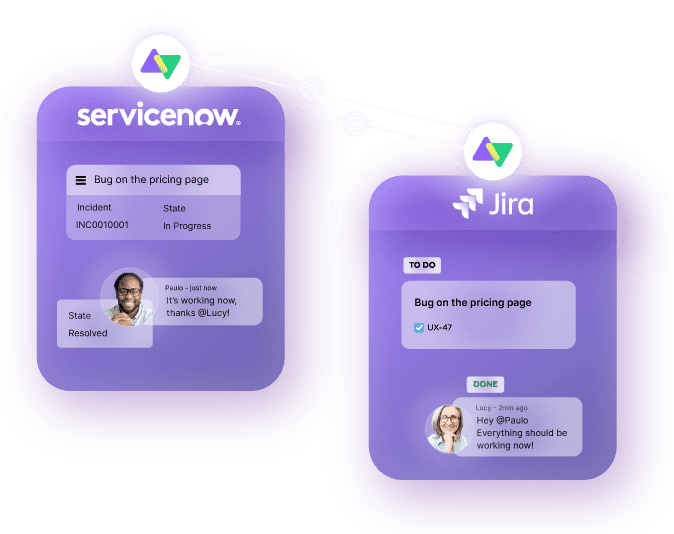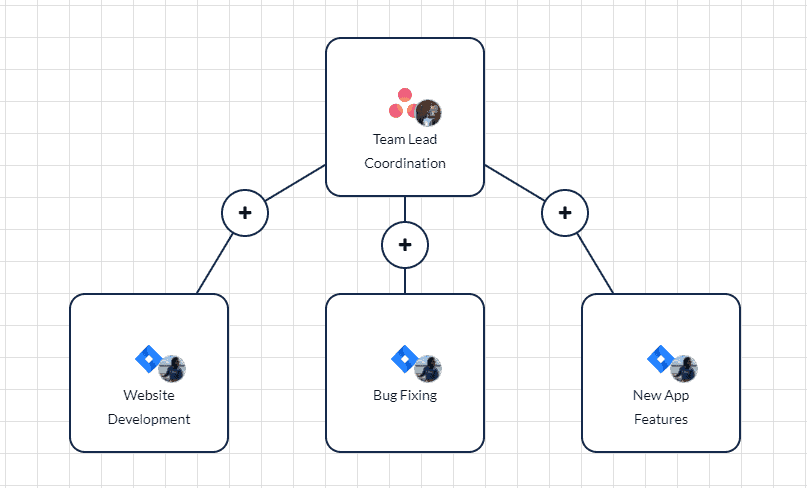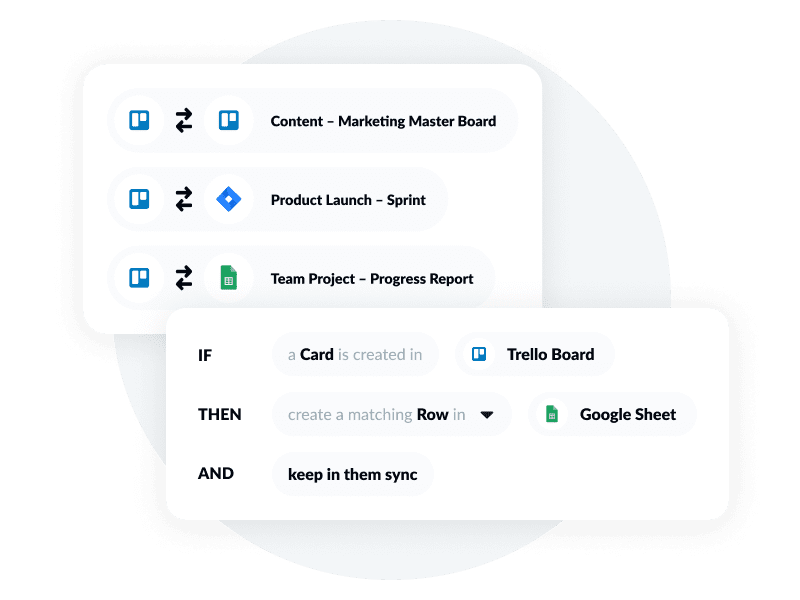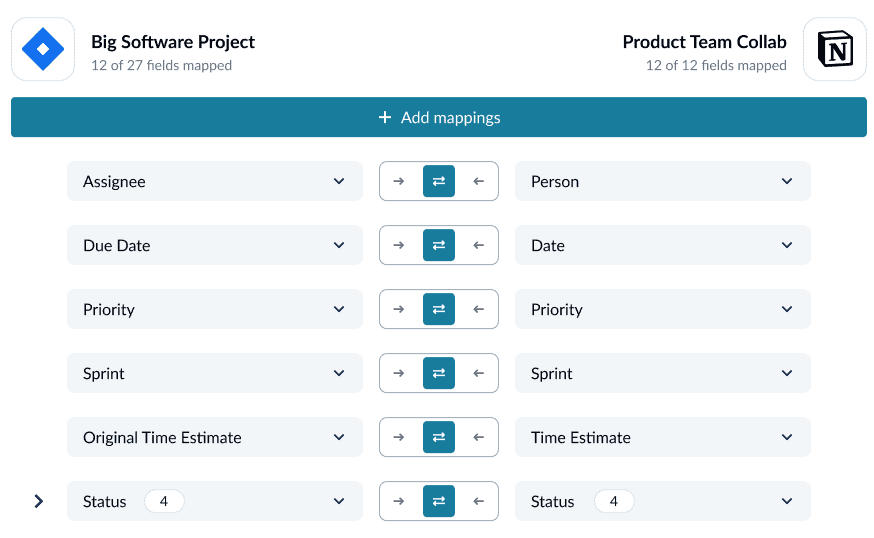Unito vs. Exalate: Which Integration Solution Do You Need?
You need an integration solution. Whether it’s your team getting sick of copying and pasting data back and forth or a leader trying to find ways to streamline workflows across the board, something has to change. You’ve come across both Unito and Exalate, and you’re wondering which one’s right for you.
So let’s see how they measure up.
What is Exalate?

Exalate is a script-based distributed integration platform that can sync data back and forth between tools popular among customer support and software development teams, like Jira, Zendesk, and GitHub. It offers a visual, no-code builder, but the platform is really at its best when you create scripts that let you fine-tune how data flows between tools.
What is Unito?

Unito is a no-code workflow management solution with the deepest two-way integrations for some of the most popular software tools out there, including Jira, Zendesk, GitHub, Asana, Trello, Google Sheets, and Microsoft Excel. With a single Unito flow, you can automatically sync data bidirectionally between two tools, keeping everyone in the loop without writing a single line of code.
Unito vs. Exalate: Features breakdown
Now that you know more about Exalate and Unito, let’s do a deep dive into how each platform works so you can know which one’s best for you.
Scripts vs. flows

While both Unito and Exalate can sync data back and forth between tools, the way they do it is a little bit different.
Exalate uses scripts to connect tools. These scripts are powered by independent applications that you install in each tool you want to integrate. So if you wanted to connect Jira and Zendesk, for example, you’d install the Exalate app from the Jira marketplace and the one from Zendesk’s marketplace.
Once they’re installed, you can finely tune your scripts to control exactly which triggers send work items from one tool to the next and how much data gets transferred over.
The advantage of this approach? It’s completely customizable. The disadvantage? It’s a lot of work to set up. And while Exalate does offer simpler, more visual ways to configure your scripts, you only get the full power of the platform if you can write code.
Unito, on the other hand, uses flows to sync data bidirectionally between tools. While there are some complicated scripts running in the background to enable a true two-way sync, you won’t need to write a single line of code. Unito’s simple flow builder will walk you through a quick step-by-step process for connecting your tools, creating rules that can filter data between them, and mapping fields to make sure that data ends up in the right place.
That does mean Unito’s flow-builder is a bit less customizable than some other workflow management solutions out there, but it more than makes up for it in saving you precious time setting things up.
So while people with advanced technical skills might benefit from Exalate’s scripts, most users will find them too difficult to deploy. Unito’s flows are just more accessible.
Winner: Unito
Number of integrations

Before you pick an integration solution, you need to know if it’s going to support the tools you use every day.
Exalate currently offers integrations for six tools: Jira, Azure DevOps, GitHub, Zendesk, ServiceNow and Salesforce. That means developers, customer support teams, and salespeople can expect Exalate to support their tool of choice — usually.
So what about Unito?
Unito has integrations for more than 30 of the most popular software tools on the market today. That includes Jira, Azure DevOps, GitHub, Salesforce, and Zendesk, as well as tools like Trello, Asana, ClickUp, Miro, Slack, Google Sheets, and Microsoft Excel.
Whether it’s a project management tool, a spreadsheet, a calendar, or a customer support platform, Unito likely has an integration for it.
Winner: Unito
Depth of integration

Both Unito and Exalate bridge the gap between tools using each tool’s built-in API, but how many fields does each tool support?
It depends.
That’s because both platforms can only sync the fields that are made available through an integration’s API, and subtle differences in how each platform actually syncs data can then make some of these fields unavailable.
For instance, Exalate’s Zendesk integration can sync 14 fields, including ticket summaries, attachments, and labels. Meanwhile, Unito can sync more than 20 Zendesk fields
But if we look at Jira, Exalate’s integration can sync over 40 fields while Unito’s integration supports 34.
So, depending on the integration, sometimes Exalate has deeper support, while Unito takes the lead for others.
Winner: Tie
Potential use cases
Exalate was built with a focus on customer support and software development from day one. Its name even refers to one of the most common workflows spanning these two teams: support ticket escalation. That’s why its integrations are exclusively platforms that are used in these workflows — except for Salesforce, which is a bit of an outlier here.
Conversely, while Unito started with a similar focus — uniting development teams with project managers — the platform has since grown to encompass more teams and more types of work. Its integrations for spreadsheets unlock automated reporting, while integrations for calendar apps mean you can know exactly where you’re needed no matter what tool you’re in.
It’s hard to support different use cases with only six integrations. Meanwhile, Unito is a platform that anyone in your organization can benefit from.
Winner: Unito
Unito vs. Exalate: Pricing
By this point, you may be falling on one side of this divide or the other. But before you make your decision, it’s important to know just how much you can expect to pay for your integration solution of choice.
Exalate
Exalate offers a free plan, which you can use to set up basic syncs between your tools. These syncs are pre-built, meaning you won’t be able to customize how they sync data or build any scripts of your own. This can be a great way to get started but will limit what you can actually do.
If you want full access to the Exalate platform, you need to pay for each tool you’re using Exalate on. So if you’re using Exalate to sync Jira issues with Zendesk tickets, you’ll pay two separate fees. Here’s how much Exalate costs for each platform:
- Jira: $6/month.
- GitHub: $115/month.
- Zendesk: $115/month.
- Salesforce: $335/month.
- Azure DevOps: $335/month.
- ServiceNow: Exalate doesn’t make pricing for this integration available on their website. You’ll have to contact their sales team for an exact quote.
Remember that you’ll pay at least two of these fees each month to use Exalate. That means the minimum you can expect to pay is $121 a month.
Unito
Unito doesn’t offer a free plan, but you’ll only be charged a single fee to get access to the platform. No doubling up on price. You can get full details on Unito’s pricing here, but here’s a basic idea of how it works. Unito offers three plans, the Basic, Pro, and Business plans.
The Basic and Pro plans let you sync one tool to any other tool in Unito’s integration library. That means you could pick Trello as your hub tool, for example, and sync work items from Jira, Miro, Asana, and more to Trello. Just remember that everything you sync has to go to Trello.
With Unito’s Business plan, you can sync any tool to any other tool. No need to sync work items back to a hub tool. That means a work item could start in Trello, go on to Jira, then to Miro, and onward to any other integration.
Whichever plan you pick, the price will be based on the number of work items you’re syncing across all tools. You can learn more about that here.
Unito also offers Enterprise plans, though you’ll have to contact our sales team to get a custom price.
Unito vs. Exalate: Security
You want to make sure the integration tool you use can be trusted to keep your data safe. Exalate boasts many of the security features you’d expect from this kind of tool, from two-way data encryption to OAuth2-based authentication and HTTPS-encrypted traffic. And Unito does too. But there’s one way in which Unito stands apart.
Unito is SOC 2 Type 2 Compliant. Exalate isn’t.
This certification ensures compliance with stringent requirements covering data privacy, information security, confidentiality, processing integrity, and availability.
If there’s someone on your team that’s especially concerned about keeping your data safe — as anyone should be — you can tell them that Unito is the best choice.
Unito vs. Exalate: Which one’s right for you?
There’s no one-size-fits-all solution, but there are enough marked differences between these two platforms that it should be pretty easy to make a decision.
If you just want to optimize workflows between customer support teams and developers, then Exalate might be the best option for you. Just keep in mind that you’ll probably need a developer on-hand to set it up for you — and fix it when things break.
But if you want a platform that anyone can use, with integrations that support every team in your organization, then Unito is a natural choice. You won’t need a developer to deploy it, and its growing list of integrations means that everyone can find a use for it.

